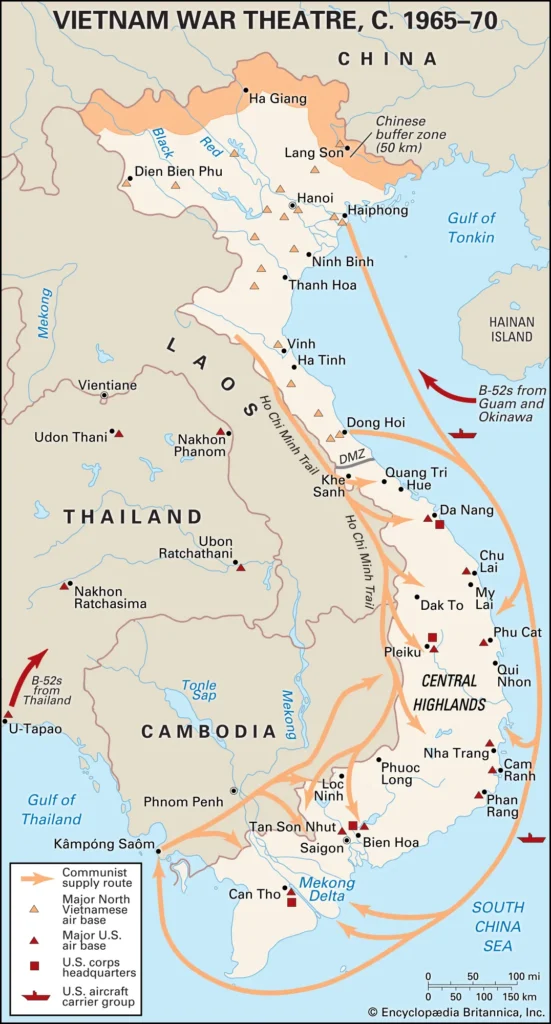Human history, despite being rather brief in terms of duration, has probably witnessed a multitude of wars. And one of those, the Vietnam War, a conflict that spanned nearly two decades, has been a subject of intense debate and reflection. If you decide to study this period, you will inevitably find yourself wondering: was the Vietnam War necessary? To be honest, the answer will depend on the point of view from which you look at the situation. That’s why we can’t give you an answer right away. So, let’s look into this topic a bit closer together.

✅ AI Essay Writer ✅ AI Detector ✅ Plagchecker ✅ Paraphraser
✅ Summarizer ✅ Citation Generator
Background of the Vietnam War
The Vietnam War, lasting from 1954 to 1975, was a protracted and deeply complex conflict that saw the communist government of North Vietnam and its allies, the Viet Cong, clash with the government of South Vietnam, backed by the United States. Known in Vietnam as the “American War,” it was part of a larger regional struggle and a manifestation of the Cold War between the United States and the Soviet Union.

The conflict originated from Vietnam’s struggle for independence from French colonial rule, culminating in the 1954 defeat of the French at the Battle of Dien Bien Phu and the subsequent division of Vietnam at the 17th parallel. North Vietnam, under the leadership of Ho Chi Minh, wanted to reunify the country under a communist regime modeled after the Soviet Union and China. In contrast, South Vietnam, supported by the US, sought to maintain a government aligned with Western ideals. This ideological was basically what set the stage for a brutal war.
Vietnam War from The Perspective of the 1950s US Governments
In the post-World War II era, American foreign policy was heavily focused on containing the spread of communism. This policy was manifested by the US involvement in the Korean War, which primary focus was to prevent the expansion of communism in Asia. Despite the challenges faced in Korea, American leadership saw it as a necessary stand against communist aggression. The logica behind such views was that if one country in Southeast Asia fell to communism, neighboring countries would inevitably follow. Considering such a “Domino Theory” it is clear why Vietnam has such a great strategis importance, especially seeing its significant population and geopolitical position.
From the perspective of the US government in the 1950s, intervention in Vietnam appeared necessary to prevent the spread of communism throughout Southeast Asia. Initially, the US involvement began with military advisors, but it escalated (rather quickly) into full-scale military engagement as the situation went downhill. Leaders like President John F. Kennedy and later Lyndon B. Johnson viewed Vietnam as a test of America’s determination to stop the spread of communism. The fear was that a communist victory in Vietnam would not only destabilize the region but also encourage other communist movements globally, potentially leading to larger conflicts.

image: vietnamtheartofwar.com
In hindsight, some of these fears may seem overstated, but at the time, US officials believed they were facing an existential threat. The commitment to Vietnam was seen as a necessary action to uphold global democracy and prevent further communist aggression and expansion. This perspective drove the substantial military and economic support provided to South Vietnam, despite the increasing costs and casualties. Understanding this mindset helps explain why US leaders felt compelled to engage in the Vietnam War, viewing it as an important front in the broader Cold War struggle.
Vietnam War as Seen From the Modern Lense
If we look at these historical events from today’s perspective, the Vietnam War often appears unnecessary and avoidable. At the time, the United States perceived North Vietnam as a significant threat, but even in that reality, North Vietnam posed little direct danger to America. The feared domino effect, where communism would sweep through Southeast Asia, did not materialize (and it hardly ever would, even without all the wars). Aside from Cambodia, the rest of the region did not fall to communism, and even Pol Pot’s Khmer Rouge regime in Cambodia was eventually overthrown by Vietnamese forces themselves.
There’s also the human cost aspect and questionable motivations behind the war. The US government, particularly under Presidents Kennedy and Johnson, justified the war using concerns over communist expansion. However, evidence now suggests that these justifications were overstated. The US public was misled about incidents like the Gulf of Tonkin, which escalated American involvement. Most critics argue that economic interests and the influence of the military-industrial complex played a much more significant role in driving the war effort than the threat of communism.

Today, the relationship between the United States and Vietnam is markedly different. The two countries engage in trade, and some American veterans even visit Vietnam to reflect on their experiences. The modern view suggests that the Vietnam War, with its immense costs and profound impacts, could have been avoided.
Conclusion
Evaluating the Vietnam War, driven by Cold War anxieties and the desire to contain communism, we can see that it resulted in a high human cost and deep societal divisions. While the conflict achieved some strategic objectives, such as temporarily halting the spread of communism, it failed to bring lasting peace to the region and had a significant effect on both Vietnam and the United States. Now, many view the war as avoidable and question the justifications provided at the time. Modern relationships between the US and Vietnam suggest that the war’s objectives might have been met through different, less costly means.
FAQ
Follow us on Reddit for more insights and updates.





Comments (0)
Welcome to A*Help comments!
We’re all about debate and discussion at A*Help.
We value the diverse opinions of users, so you may find points of view that you don’t agree with. And that’s cool. However, there are certain things we’re not OK with: attempts to manipulate our data in any way, for example, or the posting of discriminative, offensive, hateful, or disparaging material.